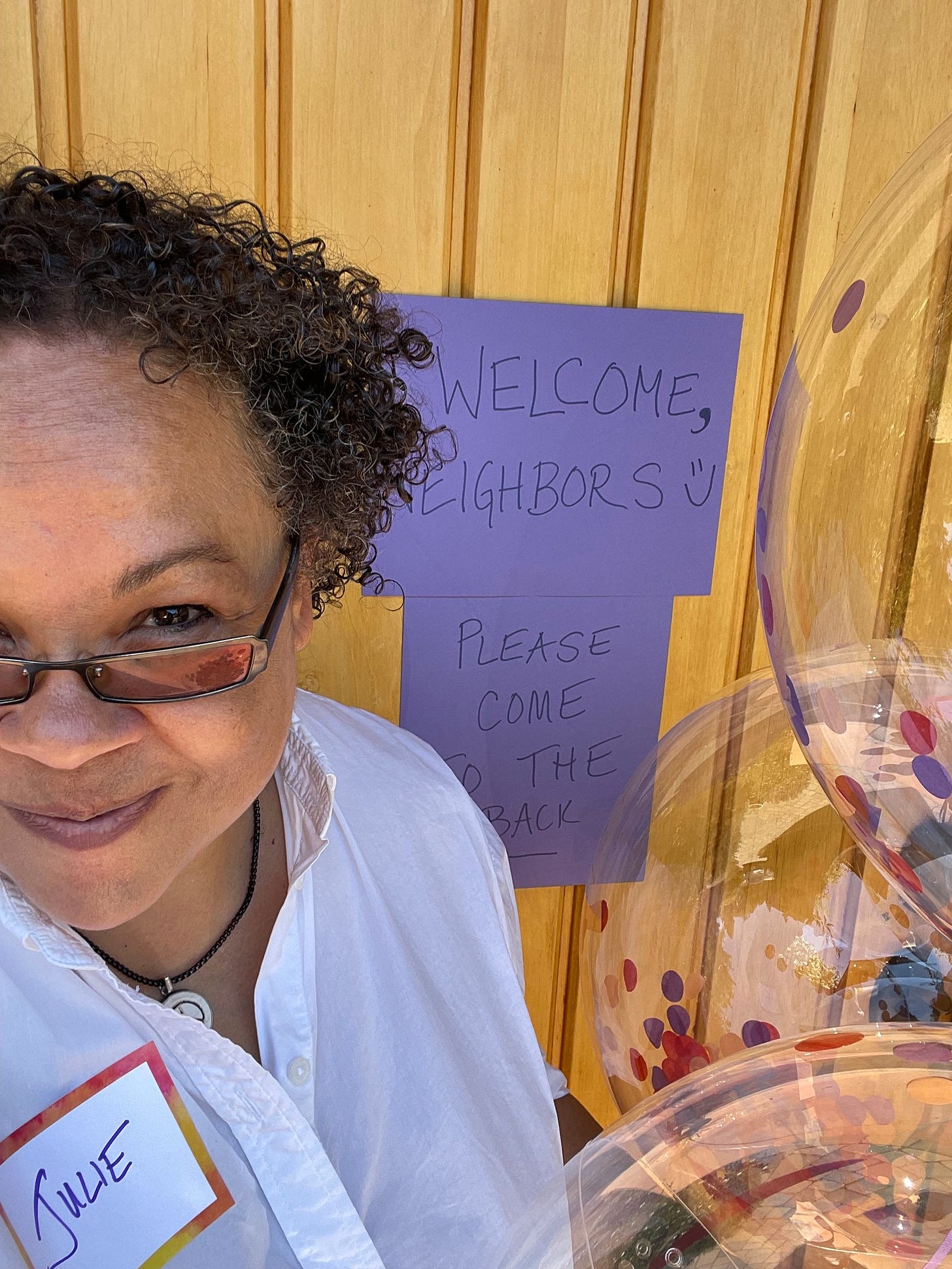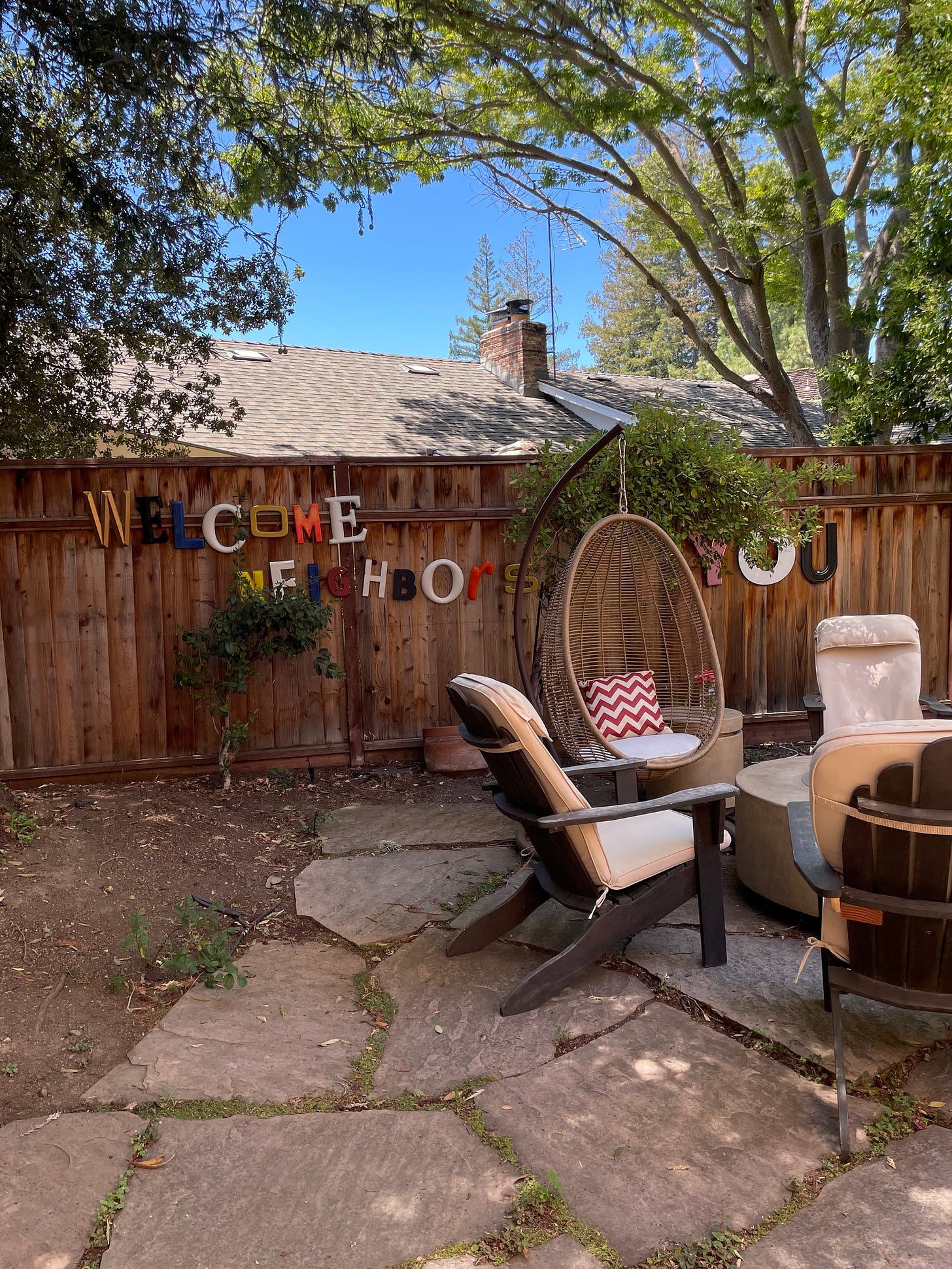We'd Long Ago Stopped Talking. I Thought They Were The Problem. Was It Also Me?
A neighbor story.
It's mid-June 2022. I walk out of my house and down the sidewalk. I see a neighbor I haven't spoken to since we had a falling out twenty years ago. (You read that right.) I'm wary. But I approach. I tell them we're throwing a gathering this Saturday to welcome the newest residents on our street. I hand them a homemade invitation and mention the date and time of the party. Their face is expressionless. I start to regret doing this. Then they speak.
_____
Here's how we got to that point.
It's 2000. Dan and I decide to go halfsies with my mom to buy a home in Palo Alto, California because of its highly-touted public schools. We can afford this particular home only because it's damaged. Problems include: two broken chimneys, windows askew in their panes, and a six-inch slope from the front door to the back door because the ground underneath the house is unstable. We live in it for a year with our one-year-old son Sawyer, while drawing up remodel plans (which turn into rebuild plans once we fully understand the instability of the soil and the need to put concrete pylons under the foundation).
It's 2001. I'm pregnant with baby number two, a girl. We move out and rent a place in a nearby town while the damaged house is demolished and rebuilt. Our baby girl Avery is born. Six weeks later, the day known as 9-11 happens.
It's early 2002. Sawyer is two-and-a-half, and Avery is six months old. Construction is well underway, and the exterior of our modern southwestern-style two-story stucco home begins to take shape. We visit the site regularly just to keep tabs on things.
During one visit, I notice the mailbox (which clings to the garage, the only part of the old house that still stands). A few pieces of paper are shoved inelegantly into the opening. On the first page, a scribbled sentence states that our house is "ugly" and insists that we change the design. At least a dozen people have signed this statement. The second page contains three black magic marker sketches of a new suggested design. My heart races. My tongue feels thick and dry. I quickly look left and right. Our home sits at the end of a street, in the cul-de-sac. I feel like I'm in a bullseye.
I consult with Dan, Mom, and our architect, Kristen. Kristen recommends that we call a neighborhood meeting to hear people out and try to settle things down. We bring bagels and cream cheese, fruit, juice, water, coffee and coffee supplies.
A crowd gathers. Although we lived there a full year before the old house was demolished, we do not know the names of most neighbors. And today, our neighbors are not particularly interested in meeting us, or in chit chat, or in any of the food or drink. They are deeply concerned about our ugly house, and they want us to hear them out.
One person shares their thoughts. Then another. And another. Wearing my infant Avery in a Baby Bjorn, I fight back tears. It feels bleak. Mean. A woman in her late seventies has been hanging her head and listening to the crowd. Now she lifts her chin and speaks.
"This doesn't feel like the Christian thing to do."
Her husband nods his head.
The vibe changes. Some leave. Others hang about. I ask the woman for her name. "Eva," she tells me. While not much of the food gets eaten, nor the drink imbibed, Eva seems to have diverted the mounting storm.
Still, resentment lingers. I get an email from a mediator saying that the neighbor who instigated the petition is taking us to mediation. The mediator offers to help us "reach a compromise about the house." I reply that not only did the city of Palo Alto approve our plans but we'd gone through a voluntary design review process where we were told, "We want to see more projects like this in Palo Alto." I tell the mediator that, like it or not, the house is being built and nothing is going to change that. But if he wants to mediate a conversation about improving neighbor relations, I'd be all for that.
I never hear back.
The house is completed in July. We move in just in time to celebrate Avery's first birthday. In October, when we trot Avery and her big brother Sawyer out for their first Halloween on this street, we stop at the house of one of the neighbors who had made their concerns very plain back at the fateful neighbor gathering. They answer the door, and their face, initially cheerful, falls into a blank stare as they hold the bowl of candy out to my small children. I say hello and thank you but they do not reply. They look right through me as if I don't exist.
As the months go by, the neighbor continues not to respond to my hellos or my hand waved in greeting as I drive by. When I see them talking to another neighbor in the street and I walk up to join, they turn and stare right through me and go home. After some number of years, I finally decide to stop trying. We skip that house when we take the children trick-or-treating. To this day, my kids (now twenty and twenty-three) refer to that house as "the people who don't like us."
_____
It's 2013. I've lived on the street in this new house for eleven years. I form a writing group for people who live on our street and nearby. Five or six of us routinely gather once a month, sometimes as many as eight. I do not invite the neighbor who doesn't speak to me.
It's 2020. Our monthly writing group meetings are disrupted by the pandemic. When it feels safe to come out and gather, masked and distanced, I suggest that we meet in a circle of chairs in the cul-de-sac, just to gather as humans, if not to write. A new-ish neighbor – who now lives in the house previously owned by the guy who instigated the petition against us – asks if we can invite the neighbor who doesn't speak to me. I respond, "You can invite them. But they've been discourteous to me since we moved into this house. So, if they come, they're going to have to treat me with courtesy." I don't know whether this message was ever passed along, but the neighbor in question never came.
I feel fine about this. But the new neighbor isn't so sanguine about it. I sense that the new neighbor may feel that I'm the one with the problem.
Am I?
_____
Over these twenty years, a number of our elderly neighbors have passed away, including Eva, whose voice in the driveway that day turned everything around. Before Eva died, I'd come to know her, well enough to hear some of her most personal stories, including how she got divorced in her forties and went out on the town with the girls quite often, and ended up getting a butterfly tattoo on her shoulder (at this point she stretched the edge of her blouse down to show it to me).
In these years, the complexion of the street has changed. When Dan, Mom, the kids and I moved here, only one other of the fourteen homes on the street was owned by a family of color. Now, half of the houses are owned by people of color, and immigrants from at least two other continents. Although it's been close to twenty years, every time I glance at the house of the neighbor who won't speak to me, I still feel their coldness which lives now in my body as anger.
At least five new families have arrived within the last few years alone. The folks who bought Eva's house have just rebuilt it. Now they're the ones moving into a rebuilt house with a one-year-old baby. I never want this street to feel like a bullseye to them or to anyone. I decide to throw a little meet-and-greet for them in our backyard and am handing out invitations to everyone on the street.
As I wrote out the invitations and mulled over whether to include the neighbor who doesn't speak to me, something in me said Can you be bigger? Something in me said Discord wins if I don't try to push past it. Something in me held out the possibility that my neighbor had changed. Something said You're resting on BEING right instead of DOING what's right.
And that's why I now find myself approaching the house belonging to this neighbor.
_____
They take the invitation from my outstretched hand.
"We won't be able to come," they begin. "But thank you for inviting us. It's kind of you."
At the risk of putting too fine a point on it, this interaction gives me hope. For me and this neighbor, for our neighborhood, and for America.
_____
Knowing neighbors well is good for our mental health. It's also really practical as a matter of just helping each other out. Tight-knit neighborhoods strengthen cities and towns. As long as we're not tight to the point of being suspicious of, or excluding of, others. (Don't do that, y'all!)
Here are some photos from our gathering, where over twenty neighbors were in attendance!
Sign on the front door directing folx to the back + balloons!
Nametags! (Essential to help newcomers and those who forget names!)
The yard cleaned up real nice!
We like letters. We turn them into words of welcome!
After initial chitchat, and enjoying potluck nibbles and drinks, Sawyer (now 23) had everyone gather in a circle where he facilitated three get-to-know you questions: 1) What's your name/Everyone responds "Hi, NAME!" 2) What do you most like about this neighborhood/city? 3) What are you about in life, not necessarily what work do you do, but who are you/what matters to you?
It went so well!
When the party ended, I posted the above photos to my Instagram story, and the next day I got a reply from a woman named Allison (@algoodman3): "Reminds me of an awesome place in my neighborhood of Pleasant Ridge, in Cincinnati called "Community Happens Here." ... A physical building ... the main goal is to build community. The owner does something twice a week called Radical Sidewalk Hospitality where she takes coffee and tea out onto the sidewalk and offers it to neighbors walking by and she strikes up conversation. ... Snow cones and pop corn for kids ... Kids/teens from the neighborhood are encouraged to come work it as well."
Allison concludes, "The idea that we are all more alike than different is something I just can't shake."
Right there with you, Allison.
____
Getting to know our neighbors may not be the easiest thing, but it's not the hardest thing either. In this American moment, knowing neighbors and strengthening those connections may be more important than ever. What do you want to do to make your neighborhood a kinder place for all? What are you already doing? Share your thoughts in the comments below!
🏚You've been in Julie's Pod, an online community for folks who know that by opening up and getting vulnerable we grow and help others do the same. There are over 10,000 people in this community now, and you can join us by subscribing here. (It's free. Subscribing just means that you'll get me in your inbox so you don't have to go searching for whatever I said next.) If you want to share this with a friend, please do.
🎁 If you've read this far, you are definitely entitled to a free "Julie's Pod" sticker for your laptop, phone, or water bottle courtesy of me and the U.S. Postal Service. Just DM me your snail mail address (or if you don't know how to DM a person, just email me@lythcott-haims.com). I promise to toss your snail mail address in the trash as soon as I pop the sticker in the mail to you!
📝 If you left a comment on any post before today, here or on social media, I've probably responded, and I always appreciate what you have to say even if I may feel differently. Please feel welcome to join the conversation. I want you to.
☎️ For those who can't comment publicly, I've set up the hotline 1-877-HI-JULIE where you can leave an anonymous voicemail to let me know what's on your mind. I respond to these calls most Mondays live on my Facebook page at noon Pacific Time (while keeping the caller's identity private).
🧐 If you missed last week's post about how my sex life was impacted by the return of our grown children during the pandemic, you can read that here. Other popular posts in Julie's Pod include one on the day COVID got me which is here, on the trauma and tragedy of youth suicide which is here, and the role parents can play in turning normal childhood fears into outright anxieties which is here.
🪢 I've decided to try to help my city be more neighborly by running for City Council. I'll say more about that soon. Consider this a sneak peek. If you dig the idea and want to contribute to my campaign click here. 😊
👋🏽 If you're interested in learning more about me and my work, please follow me @jlythcotthaims on Facebook, Instagram, Twitter, and/or TikTok and check out my website.
📸 Cover Photo Credit: Getty Images/Ray Massey/The Image Bank
@ 2022 Love Over Time LLC All Rights Reserved










